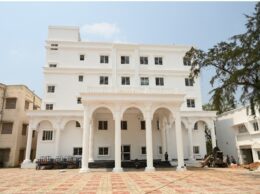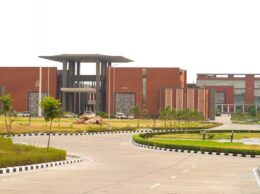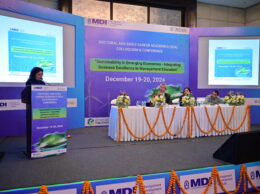Chennai, 29th January 2019: Indian Institute of Technology Dean (International and Alumni Relations) Prof. Mahesh Panchagnula, released a book today, 29th January 2019 titled ‘Mayilamma: The Life of a Tribal Eco-warrior,’ which was translated from Malayalam into English by Dr. Swarnalatha Rangrajan, Professor, Department of Humanities and Social Sciences, IIT Madras, and Dr. Sreejith Varma R., Assistant Professor, Department of English, VIT Vellore. Dr. Sreejith Varma was also a former research scholar at IIT Madras.
Speaking during the release of the book, Prof. Mahesh V. Panchagnula said, “I have always believed that humanities is the pursuit of research of humanities, it is the culmination of all efforts towards creating and perfecting technology. The quest for understanding who we are and what the society around us is, are questions central to the pursuit of this group of faculty.”
Providing a brief overview of the book, Dr. Swarnalatha Rangarajan and Dr. Sreejith Varma R. said, “The English translation, Mayilamma: The Life of a Tribal Eco-Warrior, seeks to bring a very important regional text in Malayalam – Mayilamma: Oru Jeevitham (2012) (transcribed by Jyothibai Pariyadath) into the domain of international environmental justice writing. In a typical Goliath-David kind of struggle, Mayilamma- the frail, fifty-year-old adivasi widow, who fought for the cause of the small village of Plachimada on the Kerala-Tamil Nadu border became the symbol of the global resistance against Coca-Cola. The book maps the rise of environmental activism in Kerala and it also weaves into its rhetoric the realities of consumption, globalisation, widening socio-economic inequalities and rising ecological burdens borne by the marginalised poor.”
During the occasion, Dr. Rajendra Singh, eminent water conservationist and environmentalist known as the ‘The Waterman of India’ delivered a lecture on ‘Global Warming and Climate Change Solutions via Local and Indigenous Knowledge Systems’
Mayilamma’s life narrative simply put is that of an earth carer from the fringes of the pan-Kerala struggles, who was intensely involved in the protection of livelihoods and local neighbourhoods. This life-story translates the mantra of ecology (everything is connected) into a web of concrete relations that includes not only the ecological, but also the cultural, economic and political processes.
The manner in which an Adivasi woman’s life is rhizomatically enmeshed in the rich cultural material of oral lore and tradition as well as the politics of water wars throws open a more expansive understanding of the word ‘environment.’ The ecological thought that we see in this text is contextual thinking since explaining things in terms of their contexts is really about explaining them in terms of their environment. Mayilamma’s life narrative stands testimony to the fact that the subalterns can indeed speak and that when they do so, they come into possession of an angelic strength that can defeat behemoths and giants.
Dr. Swarnalatha Rangarajan is a Professor of English at the Department of Humanities and Social Sciences, IIT Madras. She is the founding editor of the Indian Journal of Ecocriticism. Her work includes the co-edited volumes Ecocriticism of the Global South and Ecoambiguity, Community and Development: Toward a Politicized Ecocriticism, Ecocriticism: Big ideas and Practical Strategies and the forthcoming Routledge Handbook of Ecocriticism and Environmental Communication.
Dr. Sreejith Varma R. is an Assistant Professor at the Department of English, School of Social Sciences, VIT Vellore. He was a former PhD research scholar at IIT Madras. His English translations of three short stories by Narayan, the tribal fiction writer from Kerala, have appeared in the reputed journals Postcolonial Text, Muse India and eDhvani. He has also presented research papers at several national and international conferences.









